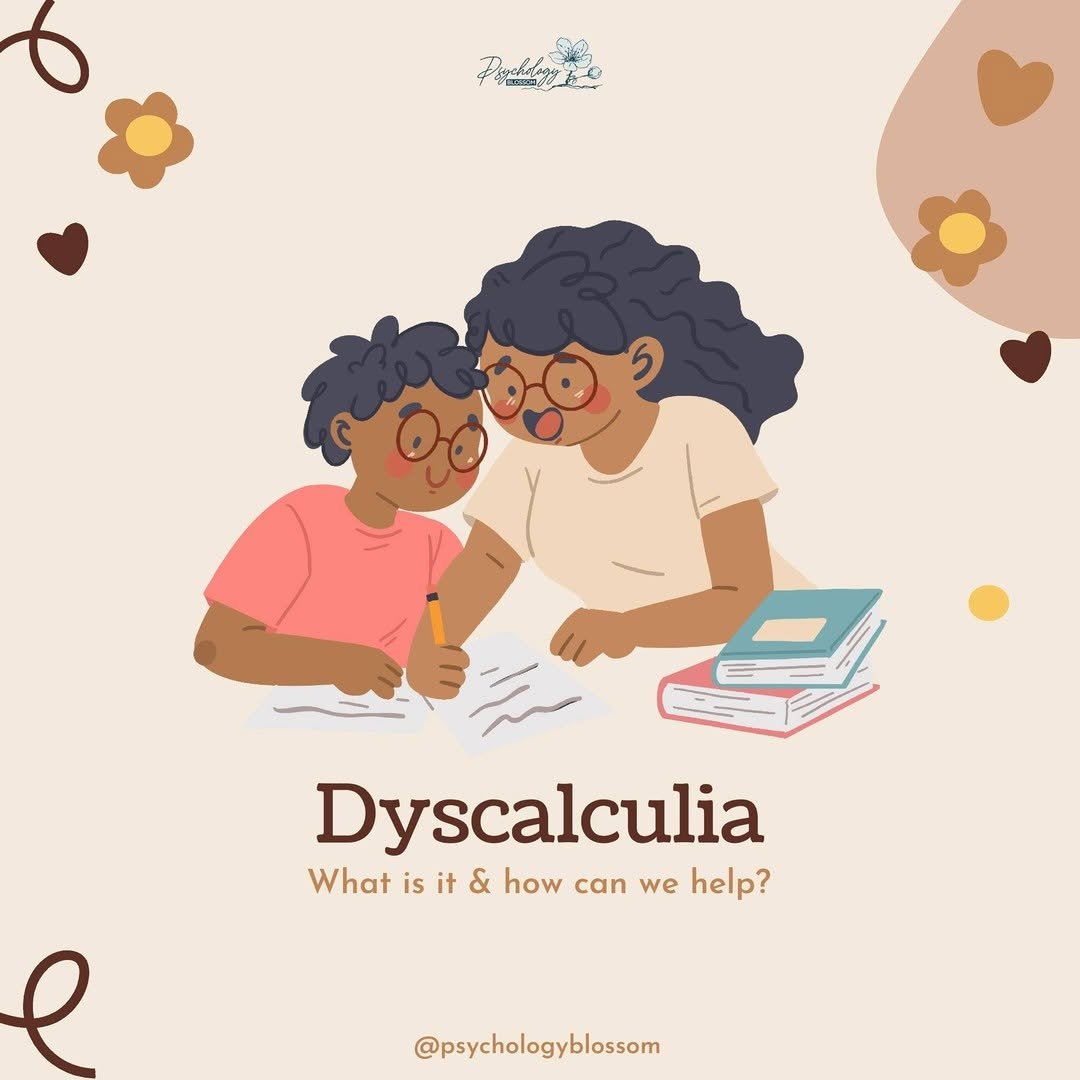Understanding Dyscalculia: When Numbers Don’t Add Up
Dyscalculia is a specific and persistent difficulty in understanding numbers and quantity, which can affect mathematical learning, problem-solving, and daily functioning. While most people occasionally struggle with math, dyscalculia is different—it represents an ongoing neurological learning difference that makes number sense and numerical reasoning consistently difficult.
Symptoms of Dyscalculia
Dyscalculia shows up in many ways, and symptoms may vary depending on age and environment. Some of the most common difficulties include:
- Number and quantity processing: Difficulty linking numbers to the quantities they represent, e.g., connecting the number 2 to two apples.
- Counting: Trouble counting forwards and backwards, or losing track when counting larger groups of objects.
- Comparison problems: Struggling to judge which of two amounts is greater.
- Subitizing difficulties: Trouble recognising small numbers of items without counting.
- Memory issues: Difficulty recalling math facts such as multiplication tables.
- Mental calculations: Struggling with calculations in the head, word problems, or multi-step tasks.
- Everyday challenges: Counting money, reading analogue clocks, linking numbers to symbols, or understanding what “quantity” means in practical situations.
- Visual-spatial orientation: Confusion with directions (left vs. right), trouble recognising number patterns, and difficulty with sequencing.
Causes of Dyscalculia
Dyscalculia does not have a single cause. Research suggests that it arises from a combination of genetic, neurological, and environmental factors:
- Genetics: Family history of learning differences such as dyslexia, ADHD, or dyscalculia increases risk.
- Brain development: Differences in regions of the brain associated with number processing and spatial reasoning.
- Environmental factors: Stressful early childhood environments, inconsistent access to quality education, or negative experiences with learning math may intensify symptoms.
Impact on Daily Life
Dyscalculia goes beyond the classroom. People with this condition may find everyday tasks challenging, such as managing finances, estimating distances, reading bus timetables, or remembering phone numbers. Over time, these challenges can create stress, avoidance of situations involving numbers, and even anxiety related to math or learning in general.
Managing Mental Health with Dyscalculia
Living with dyscalculia can affect self-esteem, especially in school or work environments where mathematical skills are often valued. To support mental health, it is important to build resilience and adopt positive coping strategies:
- Educate yourself: Learn about dyscalculia to understand that the challenges are not due to laziness but a genuine learning difference.
- Focus on strengths: Many individuals with dyscalculia excel in writing, sports, art, or problem-solving in non-numerical ways. Celebrate these abilities to balance self-image.
- Avoid negative self-talk: Replace phrases like “I can’t do this” with “I can’t do this yet,” and “I don’t know how” with “I am learning how.” This growth mindset helps reduce frustration and builds persistence.
- Build routines: Using reminders, alarms, and structured checklists reduces daily stress and helps manage tasks without relying on memory for numbers.
Supporting Children with Dyscalculia
Early intervention is crucial. Parents who suspect their child may have dyscalculia should consult a learning specialist, educational therapist, or neuropsychologist. Interventions may include:
- Specially designed teaching plans tailored to the child’s learning style.
- Math-based learning games that use play and multisensory input.
- Frequent, structured practice to strengthen number sense.
- Positive reinforcement to build confidence and reduce anxiety.
Parents can also help by creating supportive home environments, avoiding shaming language, and celebrating small progress. Working closely with teachers ensures consistency between home and school strategies.
Tips and Tricks for Everyday Coping
Practical strategies can help children and adults alike manage daily tasks more effectively:
- Use multisensory learning techniques: Counting with beads, clapping rhythms, or cooking to highlight measurements and quantities.
- Draw visuals: Illustrating math word problems with pictures or diagrams.
- Use supportive tools: Calculators, mobile apps, and extra erasers for trial-and-error learning.
- Set alarms: Use phone reminders to keep track of time for appointments or deadlines.
- Focus on effort: Emphasise persistence and problem-solving rather than perfection in results.
Dyscalculia in Adults
While dyscalculia is often identified in childhood, many adults live with undiagnosed symptoms. Adults may avoid careers involving numbers, struggle with budgeting, or feel anxious about tasks like splitting bills or following instructions with numerical steps. Recognising these struggles as part of dyscalculia can reduce shame and open the door to practical strategies such as using financial apps, setting up automatic payments, or seeking workplace accommodations.
When to Seek Professional Help
If difficulties with numbers consistently interfere with education, work, or daily functioning, professional assessment is recommended. Psychologists and educational therapists can conduct cognitive and academic testing Provide accurate Diagnosis. Early identification makes it easier to develop coping strategies and supportive interventions.
Conclusion
Dyscalculia is more than just difficulty with math—it is a neurological learning difference that affects daily life, self-confidence, and mental health. With dyscalculia assessment, supportive strategies, and the right mindset, individuals can learn to manage challenges and thrive in other areas of life. Building awareness and providing targeted support helps break down stigma and empowers those living with this condition to embrace their strengths.
We recommend This Video to those who want to learn more about Dyscalculia.
